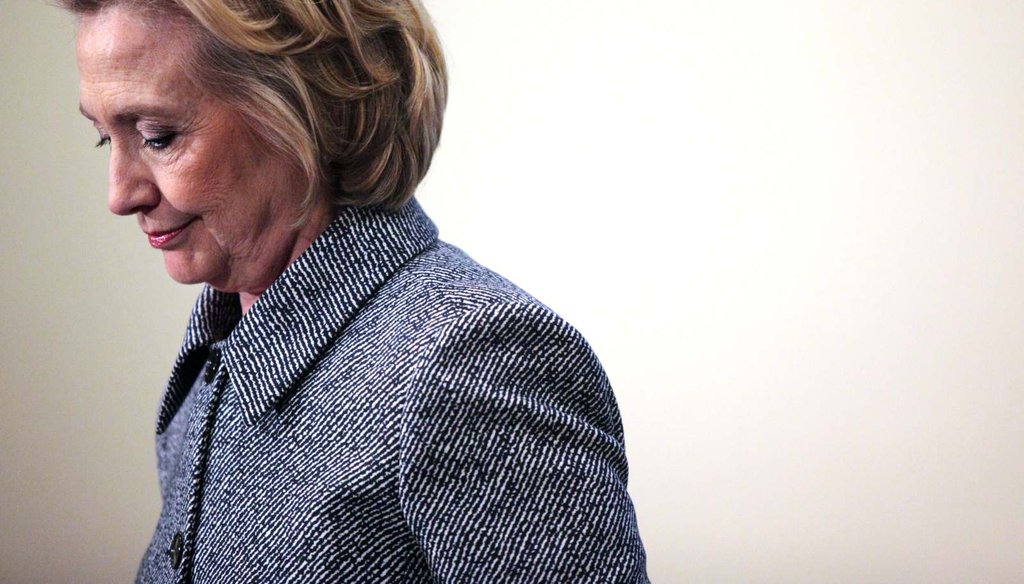Get PolitiFact in your inbox.

Former Secretary of State Hillary Clinton speaks to the media March 10, 2015 about recent allegations of an improperly used email account during her tenure. (Photo by Yana Paskova/Getty Images)
Is the media unfairly targeting Hillary Clinton?
That was a suggestion, at least, from Fox News pundit Juan Williams on Sunday. Williams compared the media reaction to Clinton’s use of private email in recent days to that of members of President George W. Bush’s administration almost eight years ago.
For those who don’t remember, some Bush staffers including top adviser Karl Rove were criticized for using Republican National Committee email accounts to perform government work.
Debating Rove, Williams said, "There has been such a feeding frenzy on the right over this issue that people think it's way out of line, and it's to the point where it's almost like a poker player turn over the table and saying, we're out of here with a big bluff because they got nothing when it comes to actually winning the 2016 campaign."
Williams then claimed that "when Karl was in trouble back in '07, no press conference. Just about zero press coverage."
We wondered if Williams had that right.
First, a quick refresher about what happened in the Bush administration. In March 2007, eyes were on then-Attorney General Alberto Gonzales after the administration unexpectedly fired eight United States attorneys. Congress investigated the firings, alleging that the administration had dropped the prosecutors for political reasons.
Over the course of the investigation, it came out that some White House officials had conducted White House business over a private emails, set up on a server through the Republican National Committee. The White House later admitted that some internal White House emails conducted on the RNC server might have been lost.
Democrats in Congress accused the administration of purposefully circumventing recordkeeping processes, while the White House said staffers were supposed to use the RNC emails solely for political affairs, not official business.
We looked back at media coverage at the time, and Williams has a point that it didn’t cause the same level of hubbub as the Clinton email scandal. Though to say there was "zero press coverage" is an exaggeration -- even allowing for a bit of hyperbole.
We did a search through Lexis-Nexis, a research service that tracks news articles and transcripts, between March and May 2007. We found more than 125 transcripts from the major cable networks and National Public Radio that include "Republican National Committee" and "email" within 10 words of each other.
The Lexis-Nexis search also yielded more than 200 related newspaper articles across the country within the same time frame.
Let’s compare that to coverage of the Clinton controversy.
Since the story broke March 3 -- two weeks ago -- we found 204 cable and public radio transcripts that include "Clinton" and "email." We also found 1,700 newspaper articles across the country.
That’s several times as many articles and transcripts about Clinton than there were about the Bush email controversy in a quarter of the time. It’s a rough measurement, but clearly there has been more media attention on Clinton’s use of private email than that of the White House staffers.
Still, saying there was "zero press coverage" of the latter scandal goes too far.
Williams’ claim rates Mostly False.
Also Sunday, CNN brought on a panel of college student leaders to discuss issues surrounding race.
One claim stuck out to us from Jalen Ross, the student council president at the University of Virginia. He said, "Every day, a black name resume is 50 percent less likely to get responded to than a white name resume."
The study that the statistic comes from is a bit old -- it was published in 2003 -- but experts say Ross basically has it correct. The claim rates Mostly True.
Using fake resumes, economists Marianne Bertrand and Sendhil Mullainathan responded to help-wanted ads for a variety of positions in the fields of sales, administrative support, clerical services and customer services posted in The Boston Globe and Chicago Tribune.
The researchers plugged in made-up names on the resumes that are associated with African-Americans (they used Lakisha Washington and Jamal Jones as examples) or whites (Emily Walsh and Greg Baker). The name on each resume was randomly assigned, so the same resume in some cases had a black name and in others had a white name.
Then they counted the callbacks.
The resumes with white-sounding names spurred 50 percent more callbacks than the ones with black-sounding names.
After responding to 1,300 ads with more than 5,000 resumes, the researchers found that the job applicants with white names needed to send 10 resumes to get one callback, but the black candidate needed to send 15 for one.
Ross erred slightly in his exact wording. While white-sounding names spurred 50 percent more callbacks than the ones with black-sounding names, black-sounding names were 33 percent less likely to get responded to.
The researchers cautioned that their findings do not reveal anything about gaps in hiring rates or earnings between whites and blacks. Also, they only focused on one avenue for job postings, newspaper ads, even though social circles represent a major way people find employment (not to mention that online postings for jobs are much more popular than they were in 2002).
David Figlio, a Northwestern University professor of education and social policy and of economics, told us he had no reason to think the dynamics have substantially changed.
"There have been a number of recent studies on related topics that suggest that similar patterns are still at work in other areas," Figlio said. "So while I can't confirm the exact number, I believe the fundamental relationship to still be true."
Our Sources
See individual fact-checks.
















































